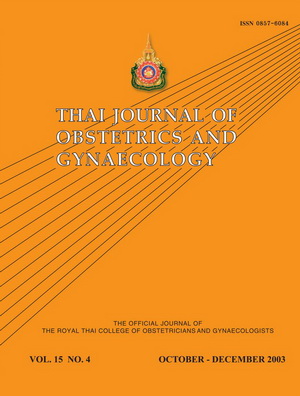Ultrasound Measurement of Placental Thickness to Detect Pregnancies Affected by Homozygous a - Thalassemia-1
Main Article Content
Abstract
Objective To evaluate the efficacy of ultrasound measurement of placental thickness (PT) at
16- 22 week’s to determine fetal homozygous alpha-thalassemial before the appearance of Hb Bart’s hydrops fetalis.
Design Retrospective and prospective descriptive study.
Setting Maternal-fetal medicine Unit, King Chulalongkorn Memorial Hospital, Bangkok, Thailand.
Subjects 216 pregnant women at risk for having a fetus with Hb Bart’s disease attending the antenatal clinic at King Chulalongkorn Memorial Hospital, were recruited to the study from June 2000 to May 2003.
Method We measured placental thickness by ultrasound at 16-22 weeks’ gestation in 216
at-risk pregnant. Pregnancies at risk were examined serially by ultrasound to measure the placental thickness and other features of hydropic fetuses. Cordocentesis for hemoglobin study was done to confirm the diagnosis of Bart’s hydrops fetalis. Unaffected fetuses were followed up by serial ultrasound scanning every 4 weeks until the 28th weeks of gestation, also all unaffected fetuses were confirmed after birth. The sensitivity and specificity with 95% Cl were calculated for various cut-off levels of placental thickness (ROC curve) for different gestational ages.
Results The sensitivity and specificity in detecting affected pregnancies, at 16-18 week’s gestation at cut-off 3.22 cm placental thickness by ROC curve were 0.95 (0.89-1) and specificity 0.96 (0.93-0.99). At 18-20 weeks, at cut-off 3.56 cm. the figures were 0.90 (0.590.98) and 0.96 (0.70-0.98), respectively. At 20-22 week’s gestation at cut-off 3.85 cm sensitivity and specificity were 0.90 (0.59-0.98) 0.95 (0.70-0.98), respectively.
Conclusion On the basis of the receiver operating characteristic curve using those cut off values of placental thickness measurement has very high accuracy in predicting homozygous alpha-thalassemic fetuses. The placental thickness sonographic parameter should be considered to reduce the number of the invasive procedures in dianosis of Bart’s hydrops fetalis.


